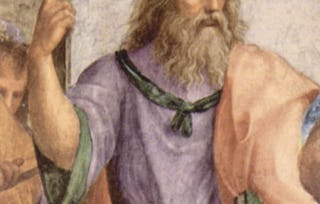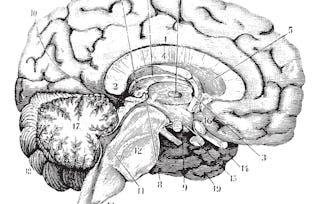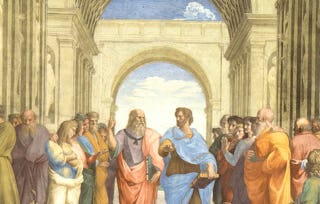What is philosophy? How does it differ from science, religion, and other modes of human discourse? This course traces the origins of philosophy in the Western tradition in the thinkers of Ancient Greece. We begin with the Presocratic natural philosophers who were active in Ionia in the 6th century BCE and are also credited with being the first scientists. Thales, Anaximander, and Anaximines made bold proposals about the ultimate constituents of reality, while Heraclitus insisted that there is an underlying order to the changing world. Parmenides of Elea formulated a powerful objection to all these proposals, while later Greek theorists (such as Anaxagoras and the atomist Democritus) attempted to answer that objection. In fifth-century Athens, Socrates insisted on the importance of the fundamental ethical question—“How shall I live?”—and his pupil, Plato, and Plato’s pupil, Aristotle, developed elaborate philosophical systems to explain the nature of reality, knowledge, and human happiness. After the death of Aristotle, in the Hellenistic period, Epicureans and Stoics developed and transformed that earlier tradition. We will study the major doctrines of all these thinkers. Part I will cover Plato and his predecessors. Part II will cover Aristotle and his successors.

Ancient Philosophy: Aristotle and His Successors

Ancient Philosophy: Aristotle and His Successors

Instructor: Susan Sauvé Meyer
Access provided by ITC-Infotech
74,382 already enrolled
776 reviews
Skills you'll gain
Details to know

Add to your LinkedIn profile
See how employees at top companies are mastering in-demand skills

There are 5 modules in this course
Aristotle’s anti-Platonic metaphysics: the ultimate realities are ordinary objects of our experience, like people and animals. Each of these is a substances, the most fundamental type of being.
What's included
6 videos1 reading2 assignments1 discussion prompt
Natural substances have matter and form, and natural processes are goal-directed. Every living thing, plants and animals included, has a soul that moves it.
What's included
6 videos2 readings3 assignments1 discussion prompt
The motion of the universe is eternal and its cause is an eternal unmoved mover, Aristotle’s god. Our goal in life is to achieve happiness, which comes in two varieties: the human happiness we achieve by exercising the virtues of character, and the godlike happiness we achieve when we grasp eternal truths.
What's included
9 videos2 readings2 assignments2 discussion prompts
Epicureans return to the atomism of Democritus, and find no purpose in nature. Philosophy is a therapeutic practice that removes fear and anxiety and provides us with the tranquility (ataraxia) of the gods.
What's included
8 videos4 readings2 assignments2 discussion prompts
A providential god is at work in every detail of the cosmos, where everything happens by fate. Our goal in life is to accommodate ourselves to this divine nature by giving up our concern for (but not our pursuit of) worldly objectives.
What's included
9 videos4 readings2 assignments1 peer review2 discussion prompts
Instructor

Offered by
Why people choose Coursera for their career

Felipe M.

Jennifer J.

Larry W.

Chaitanya A.
Learner reviews
- 5 stars
85.18%
- 4 stars
12.88%
- 3 stars
1.15%
- 2 stars
0.51%
- 1 star
0.25%
Showing 3 of 776
Reviewed on Feb 1, 2019
This is an excellent course! The professor is well-timed and the resource material well-selected. In-depth treatment of Aristotle, the Stoics, and the Epicureans. Highly recommended.
Reviewed on Apr 25, 2019
Excellent course, Pr. Sauvé-Meyer keeps the material very engaging, and makes it very clear and easily accessible. Knowing how difficult the original texts are sometimes, this is very valuable.
Reviewed on Feb 18, 2022
The course did not only serve as a refresher course on Aristotle, it actually capacitated me to know more and anew. Thank you for this program.
Explore more from Arts and Humanities

University of Pennsylvania

University of Arizona

University of Pennsylvania

The University of Edinburgh
¹ Some assignments in this course are AI-graded. For these assignments, your data will be used in accordance with Coursera's Privacy Notice.

